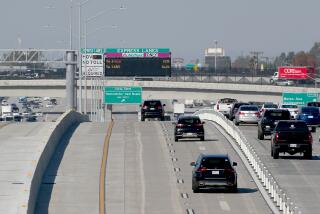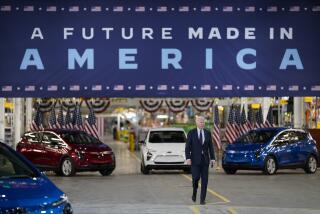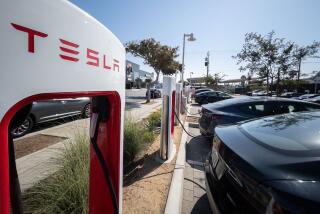In California, Prius is king
The bestselling vehicle in America is Ford’s big F-Series pickup. California’s favorite car is a hybrid that can almost fit in the bed of that truck.
Underscoring the state’s eco-consciousness, pricey gas and crowded commutes, Toyota’s Prius has toppled the Honda Civic from its two-year reign as the bestselling vehicle in California.
Since its introduction more than a decade ago, the hybrid has developed a loyal following in California, which accounts for more than a quarter of U.S. Prius sales. Its popularity in the state — along with the disdain for big trucks — demonstrates just how much the California car market differs from the rest of the nation, analysts said. The Prius couldn’t even crack the top 10 in sales nationally, finishing 14th.
The Prius now leads by a thin margin in California, selling 60,688 cars last year compared with 57,124 Honda Civics sold. The Toyota Camry placed third with sales of 50,250, according to California New Car Dealers Assn. sales data, which do not include fleet sales.
Ford’s F-Series pickup truck, perennially the national bestseller, placed seventh in California with sales of 25,434 — less than half of Prius sales. The Chevrolet Silverado truck, the second bestseller nationally last year, sold just 17,804, not even close to the top 10 and behind such disparate vehicles as the Hyundai Elantra compact car and the BMW 3 Series sports sedan.
California’s favorite truck or sport utility was the relatively small Honda CR-V, known for its car-like handling. The CR-V racked up sales of 29,055.
California’s disinterest in trucks “speaks to the high percentage of drivers that commute long distances. The need to travel 30 to 40 miles to and from work per day makes the prospect of owning a Ford F-Series or Chevrolet Silverado an expensive one,” said Alec Gutierrez, an analyst at auto price information company Kelley Blue Book.
Toyota is selling the Prius to environmentally sensitive consumers such as Long Beach aerospace engineer Cleave Law, who has purchased at least one of each generation over the last 11 years, including the ungainly first-generation Prius in 2001.
“It works well, especially in terms of mileage, and it is comfortable, even on long trips,” Law said.
As an engineer, he likes the design of the Prius hybrid system better than some of its hybrid rivals. Serial purchases have been made easier by the fact that he has yet to experience any mechanical or battery failures.
Other buyers are more attracted by the practical, rather than environmental, aspects of the Prius.
“We buy vehicles based on functionality and reliability,” said Thomas Sexton, a retired engineer from Huntington Beach who purchased the station-wagon version Prius V model in August. Sexton said he liked the combination of solid ride, cargo capacity and fuel efficiency.
California’s gasoline prices are consistently among the highest in the nation.
But cultural factors also influence the dominance of cars over trucks in the state, said Peter Welch, chief executive of the California New Car Dealers Assn. “Eight years ago, everyone was driving sport utilities and trucks. Now it’s almost trendy to drive a fuel-efficient hybrid or plug-in,” he said.
Hybrids, plug-in hybrids and electric-only vehicles now make up 7.4% of the California market, more than double the national average. Plug-ins, such as the Chevrolet Volt and one version of the Prius, can travel a certain distance on electricity alone before a gas engine kicks in and extends the range.
Sales of conventional hybrids are rising even though they don’t get state or federal subsidies, which are reserved for fully electric and plug-in hybrid cars. The Prius plug-in, which accounts for only 6% of Prius’ sales, is eligible for a $2,500 federal subsidy and a $1,500 state rebate, along with carpool access for drivers with no passengers.
Ironically, a wide-open carpool lane isn’t the place to show off a hybrid’s gas-sipping prowess.
“You get better mileage in stop-and-go traffic, which the HOV lane is supposed to alleviate, so it’s an interesting juxtaposition,” said Rebecca Lindland, an analyst with IHS Automotive.
Toyota sells four versions of the hybrid. The hatchback is the biggest seller. The other versions are a plug-in hatchback, a Prius C mini-car and the Prius V station wagon.
Overall, auto sales — including fleet sales — rose 25% in California last year, almost double the national growth rate of 13.4%, according to the state dealer group.
Japanese brands, rebounding from inventory and production problems caused by the Japanese earthquake in 2011, had the fastest growth. They now control 46.3% of the California auto market, up from 44.5% in 2011.
Most of that growth came at the expense of domestic brands, which saw their combined market share slide to 29.7% from 31.6%. The domestic car companies do much better nationally, where they control almost 45% of auto sales.
Toyota and its brands are the biggest sellers in California, owning 21.1% of the market. Honda follows with 12.5%, and Ford is third at 11.3%. General Motors, at 11.2%, and Nissan, at 8.3%, round out the top five. Fast-growing Volkswagen, with 5.5% of the market, has almost caught Chrysler’s 6.5% share.
Led by the Prius, Toyota dominates the California market, but it can’t rest on its laurels. Law, the Long Beach engineer, is holding on to one of his Priuses, but he already replaced the other with what he called the next best thing — an all-electric Ford Focus that during daylight he charges using the solar panels on the roof of his home.







